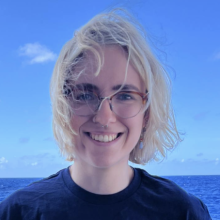
Eva Stewart
Tell us about your work/research. What kinds of things do you do?
My research uses a combination of techniques, including genetics and morphology, to understand the systematics, ecology, and evolution of invertebrates across the deep-ocean floor. My current focus is on the animals living in areas being targeted for potential deep-sea mining in the abyssal Pacific Ocean. I want to understand their distributions and how communities of animals are structured so that we can effectively protect them from the impacts of mining.
Around 90% of the animals we collect in the deep Pacific are un-described, meaning they don't have an official scientific name. A big part of my work is taxonomy, which involves identifying species and describing new ones. This is really important in the context of deep-sea mining as we can't understand or protect something if we don't know it exists. Working at the Natural History Museum in London gives me access to over 200 years of material collected across the world, and I use this as an amazing reference catalogue to compare our current samples with ones collected before.
What sparked your initial interest in your career?
I grew up in London so was pretty far away from the ocean, however whenever we went camping on holiday my dad would take us to the beach to look in the rock pools. There is such amazing marine life around the coast of the UK and I would spend hours searching through the seaweed and under rocks looking for crabs and worms! I had always thought that I wanted to study Art at university, but I was encouraged to go to a Marine Biology open day which completely changed my mind. While I was at Newcastle University I was introduced to the deep sea and I was so inspired by how beautiful and unknown the environment was that I've been focused on it ever since.
Who influenced you or encouraged you the most?
I have been really lucky to work with some amazing and supportive scientists so far in my career. Johanna Weston first introduced me to taxonomy when I was an undergrad which was something completely new to me and has really inspired me in my career so far, and all of my current PhD supervisors and my lab group are fantastic. My family have also been very supportive through all the ups and downs of working in science – I named the first species I described after my Grandma to say thank you for all of her help and encouragement!
What element of your work/study do you think is the most fascinating?
The most fascinating part of my research is being able to work with animals that nobody else has ever seen before! My favourite part of describing new species is illustrating them, which then gets published to help other people identify the species in the future. Seeing these amazing and alien creatures so up close and personal is such a privilege and never gets less exciting.
How did you get involved with the Ocean Exploration Trust?
I got involved with Ocean Exploration Trust through the Ocean Census. There was a call for taxonomists to come on an expedition to help discover new deep-sea species and so I sent out an email and a week later received the invite!
What other jobs led you to your current career?
I have had a pretty conventional career path into academic research so far. After my undergraduate degree I did a Masters degree in Biodiversity Evolution and Conservation at University College London because it had the option of working at the Natural History Museum. There I met my current supervisor Adrian Glover and have been working in the deep-sea lab ever since! After my masters I worked for one year as a research assistant at the museum before starting my PhD. Alongside doing my degrees though I've worked lots of different jobs to help support myself, including being a receptionist at a dentist, as a bartender, and I spent one summer working in a lab at a brewery testing the beer!
What are your degrees and certifications?
BSc (Hons) Marine Biology - Newcastle University (2016-2019)
MRes Biodiversity, Evolution, and Conservation - University College London (2019-2020)
PhD Deep-sea Biology - University of Southampton (Hopefully finishing in 2025!)
What are your hobbies?
I love being anywhere near the water, so do a lot of swimming and I try to get to the beach as much as I can. I enjoy running, yoga, climbing, and walking along the river eating nice pastries from cafes. I also do lots of drawing and make lino-prints (usually of marine animals!).
What advice would you give someone who wants to have a career like yours?
My advice would be to find something you're really passionate about, it can be quite hard working in science at times, so being really excited and interesting in what you're working on can make a huge difference. I found it really helpful to talk to my teachers and professors outside of lectures about the work I wanted to do, they had lots of good advice and were able to put me in touch with other researchers in the same field.
Expeditions
Eva participated in the following Ocean Exploration Trust expeditions:
